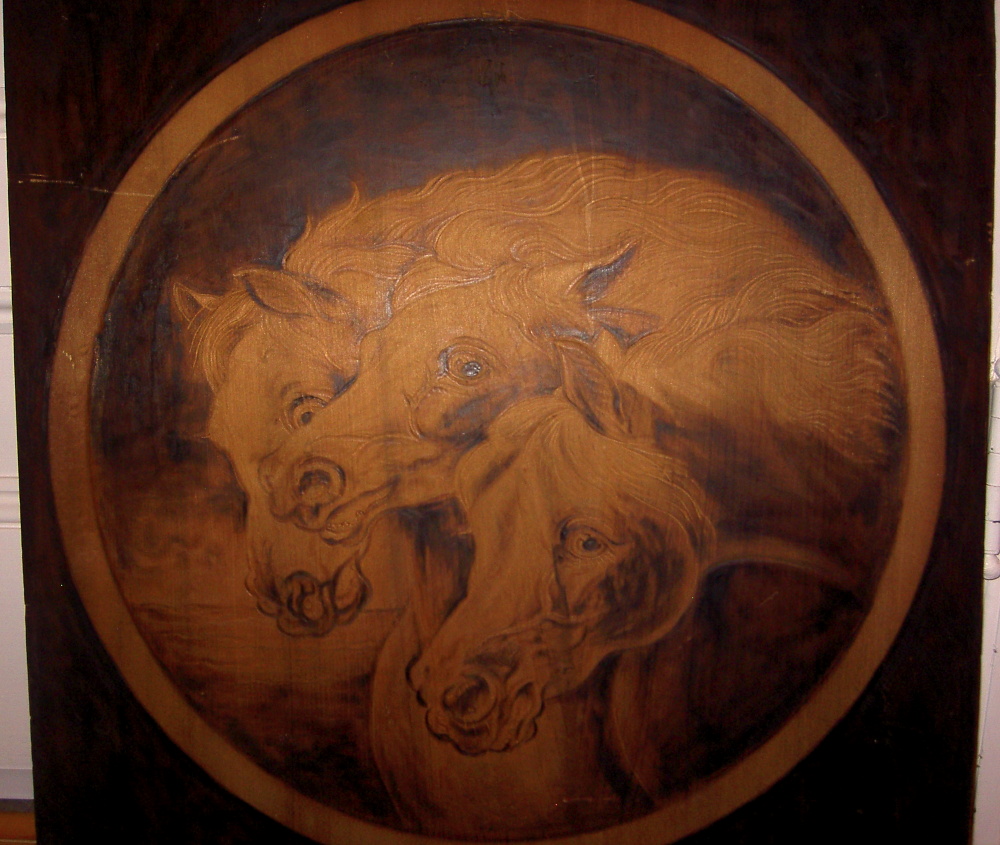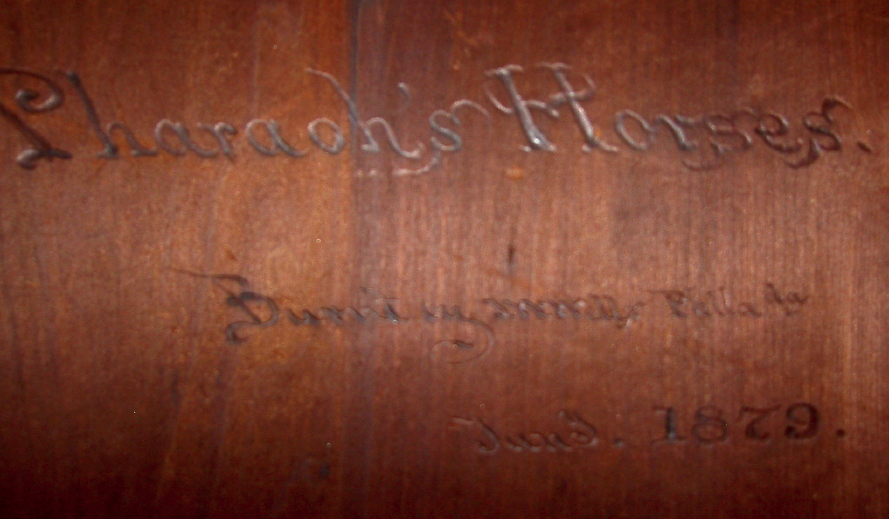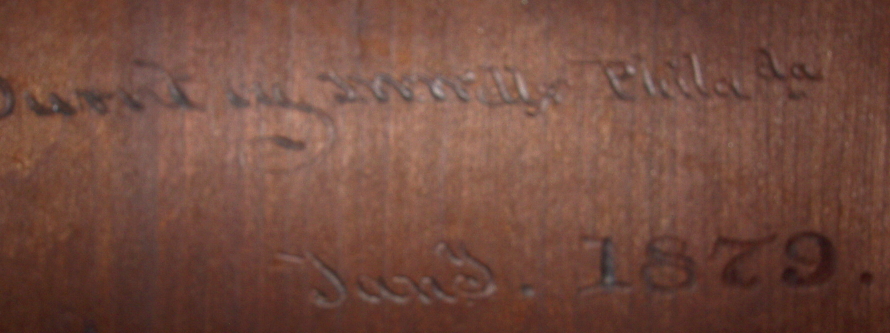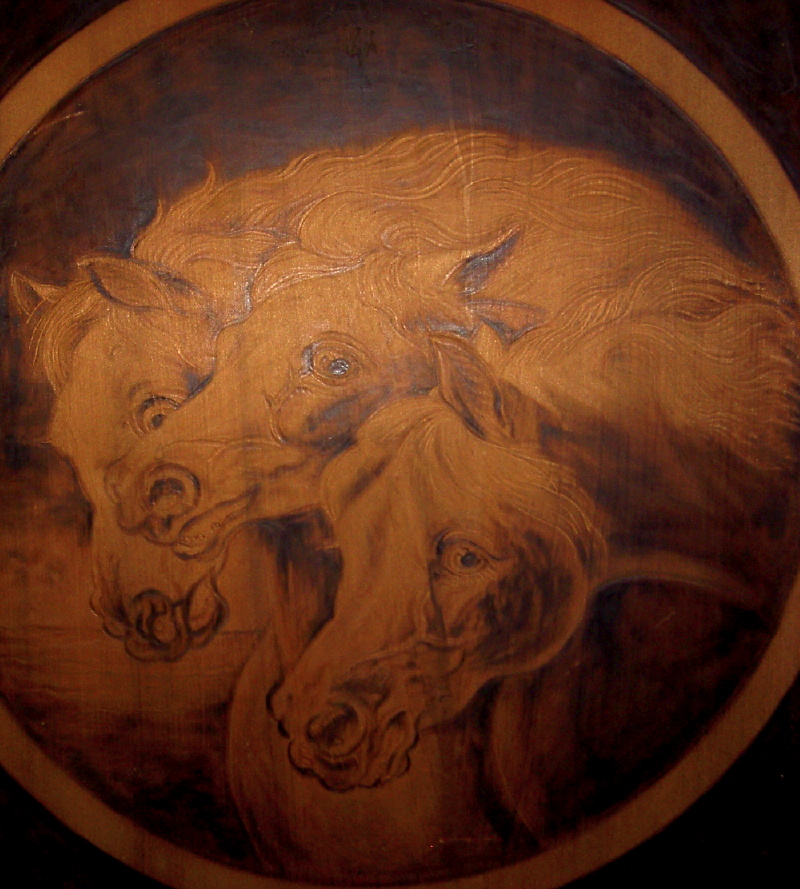E-Museum of Pyrographic ArtAntique Art Hall
|
| - Café Flambé - | - Portraits and Paintings - | - Decorative and Applied Art - |
| - Folk and Traditional Art - | - Antique Art - | - Special Hall - | - Sculpture - |
| - Children's Hall - | - Bookstore and Library - | - Tools and Techniques - |
 |
| Pharaoh's Horses By I. W. Wells, January 1879 Pyrography and carving on wood panel, approximately 25.5 inches square with a 23-inch diameter circular image of three horses Image thanks to the owners |
 |  |
| Pharaoh's Horses
Verso, detail of the inscription, title and signature, in two views By I. W. Wells, January 1879 Inscription, verso, reads: Pharaoh's Horses Burnt by I.W.Wells PhiladaNote that the word Philadelphia is abbreviated in the custom of that time, i.e., showing only the initial 'd' of the second half and the final 'a' and both together in an underlined superscript. The word January is abbreviated by eliminating the 'uar' and writing the 'y' in full size starting somewhat above the other letters and ending with a big flourish. The '1879' appears stamped in almost. Pyrography and carving on wood panel, approximately 25.5 inches square with a 23-inch diameter circular image of three horses Image thanks to the owners |
 |
| Pharaoh's Horses, Detail By I. W. Wells, January 1879 Pyrography and carving on wood panel, approximately 25.5 inches square with a 23-inch diameter circular image of three horses Image thanks to the owners |
American collectors Jim and Linda Pierson acquired this panel by I. W. Wells in December 2014 at an auction in Morrisonville, New York. The Wells work exhibited here is after an 1848 painting by John Frederick Herring, Sr..
In comparing all of the inscriptions on the Wells works that have come to light in recent years, it is apparent that the artist had a very random writing style, with elaborate flourishes and a backhanded script, which changed to a forward slant whenever he dedicated a commissioned work to a client or recipient. The script changes size and is often uneven. As the new owners of this work noted, "It is interesting that the 's' in Wells looks like the segno symbol used in music." The artist's name could easily be interpreted as J. W. Wells rather than I. W. Wells because of his pseudo calligraphic style; however, it is worth noting that Wells' upper case I in the title "Independence" inscribed on the verso of his panel, exhibited in the E-Museum at the link here to his Salon No. 4, looks very much like the first initial of his name. As we likewise can observe with his upper case J in January in the inscriptions verso displayed above, it is apparent that Wells wrote his J in the same way as he wrote his I in the inscription for his work "Independence." Thus, we are loathe to conclude that the ambiguity regarding his first initial remains.
A picture of a Wells work can be seen in the companion book that was written by Edward and Eva Pinto, the original owners of that work and of about 19 others that were acquired by the Birmingham Museums and today form the Pinto Collection there. Four works in pyrography are on display at the web site of the Pinto Collection in Birmingham, England, although not their work by I. W. Wells.
Susan Millis, who has an advanced degree in the conservation and restoration of pyrographic works, has studied at length and under magnification the works in the Pinto Collection. She is encouraged that the 1879 Wells work of the "Pharaoh's Horses" displayed here could well be by the same artist who did the 1866 panel "Waiting for the Plough" that is in England.
Notes on that important collection, including on I. W. Wells, were given by Susan Millis in an interview for Pyrograffiti at the link here.
If you have either any questions to ask or any additional information to offer about I. W. Wells or this panel by him, please e-mail the E-Museum Curator.
You are leaving the
I. W. Wells Salon No. 8
You can also visit the
I. W. Wells Salon No. 7,
I. W. Wells Salon No. 6,
I. W. Wells Salon No. 5,
I. W. Wells Salon No. 4,
I. W. Wells Salon No. 3,
I. W. Wells Salon No. 2,
I. W. Wells Salon No. 1,
the Antique Hall
or visit one of the following:
Contemporary Pyrographic Art Exhibit Halls:
Portraits and Paintings
Decorative and Applied Art
Sculpture
Traditional and Folk Art
Children's Pyrographic Art
Special Pyrographic Art
The Book Store and E-Museum Library
Pyrography Tools and Techniques
Your questions and comments are welcome and appreciated.
Please e-mail the E-Museum Curator
I. W. Wells Salon No. 5,
I. W. Wells Salon No. 4,
I. W. Wells Salon No. 3,
I. W. Wells Salon No. 2,
I. W. Wells Salon No. 1,
the Antique Hall
or visit one of the following:
Contemporary Pyrographic Art Exhibit Halls:
Portraits and Paintings
Decorative and Applied Art
Sculpture
Traditional and Folk Art
Children's Pyrographic Art
Special Pyrographic Art
The Book Store and E-Museum Library
Pyrography Tools and Techniques
Your questions and comments are welcome and appreciated.
Please e-mail the E-Museum Curator
I. W. Wells Salon No. 3,
I. W. Wells Salon No. 2,
I. W. Wells Salon No. 1,
the Antique Hall
or visit one of the following:
Contemporary Pyrographic Art Exhibit Halls:
Portraits and Paintings
Decorative and Applied Art
Sculpture
Traditional and Folk Art
Children's Pyrographic Art
Special Pyrographic Art
The Book Store and E-Museum Library
Pyrography Tools and Techniques
Your questions and comments are welcome and appreciated.
Please e-mail the E-Museum Curator
I. W. Wells Salon No. 1,
the Antique Hall
or visit one of the following:
Contemporary Pyrographic Art Exhibit Halls:
Portraits and Paintings
Decorative and Applied Art
Sculpture
Traditional and Folk Art
Children's Pyrographic Art
Special Pyrographic Art
The Book Store and E-Museum Library
Pyrography Tools and Techniques
Your questions and comments are welcome and appreciated.
Please e-mail the E-Museum Curator
Please e-mail the E-Museum Curator
Back to E-Museum Entrance homepage
© 2015 Kathleen M. Garvey Menéndez, all rights reserved.
28 January to 11 February 2015.

